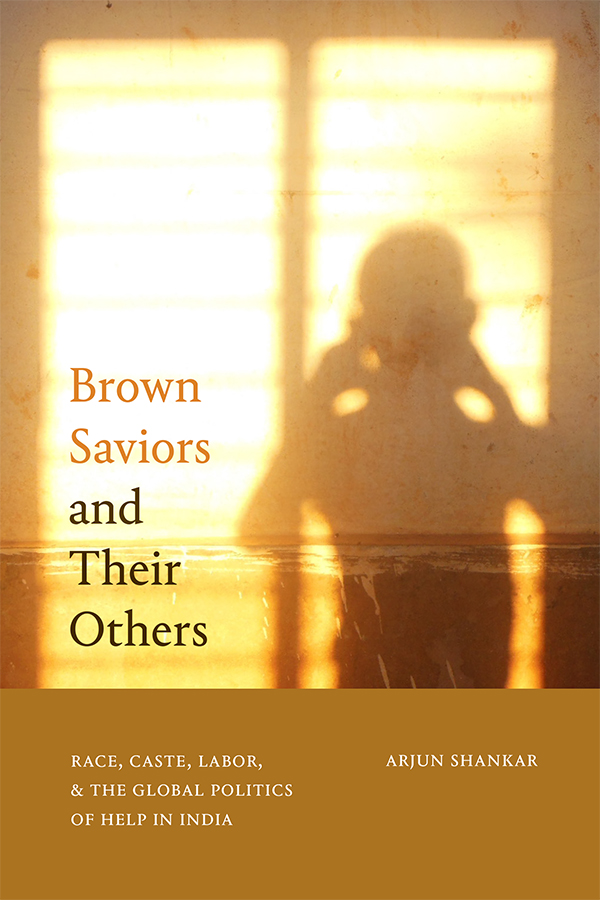
Over fifteen years ago I conducted an ethnography of NGO-led reforms in primary schools in Karnataka, India – the same region in which Arjun Shankar’s research for Brown Saviors and Their Others takes place. NGOs in India are often led by networks of dominant-caste, urban and diasporic Indian elites who claim to be working for marginalised caste communities. Yet, the dynamics of racism, casteism and capitalism that shape NGO interventions was left implicit rather than foregrounded in my research, just as these dynamics are too often made invisible in the policies and practices of NGOs themselves. As Shankar’s book brilliantly shows, the interlocking dynamics of racism, casteism and capitalist extraction are constitutive of how the ‘help economies’ of development and outreach are structured and sustained in India. With Shankar’s book, it is impossible to look away from that which has always been there: the ongoing, everyday entrenchment of casteist and racist exclusion in ‘the NGO world’ under the guise of do-good liberal saviourism. Brown Saviors has made me completely reassess my early work. It is a book that every researcher of development, education, and public policy must read.
Brown Saviors and Their Others presents an ethnography of an education NGO in South India. It focuses on the daily operations of an organisation and how (transnational) labour politics, institutional priorities, and racialised interactions such as gatekeeping, silences and even laughter legitimise and reproduce casteist and racist exclusions. It is an account of the ongoing making of racial capitalist structures. This is not research that sets out to evaluate the effectiveness or outcomes of NGOs, but rather seeks to excavate the often-unacknowledged affective and material relations that make up NGO work and worlds. The ‘brown savior’ as an analytic tool, Shankar writes, ‘allows us to see how and why specific elite actors emerge from the postcolonized fold as those who are imagined to bring salvation even as others in the brown world remain “in need”’.[1] It is a figure that shores up entire economies of ‘help’ – markets of saviourhood premised on racial-caste hierarchies. Here, Shankar deftly mobilises an analysis of the materialities of oppression in India to trace the interactions between casteism and racism. The racialized capacities claimed by the Hindu, and specifically the brahmin, ‘allow for the emergence of a class of savarna Hindus who ascend to the role of saviour’.[2]
To understand the work of the brown savior, Shankar offers us a ‘nervous ethnography’ – a reflexive methodological approach that refuses the position of the distanced powerful observer. Instead, it is an approach that is tuned into the embodied, affective, and structural ways in which researchers are themselves enmeshed and implicated in processes of ‘brown saviorhood’. As Shankar explains, it is ‘nerve-wracking’ precisely because ‘it requires that we tell the story in a way that reveals our potential culpability’.[3] Given the hubris of much development intervention, and the powerful ecosystems of NGO practice, research and evaluation in India (and beyond), methodological ‘nervousness’ is a much-needed and highly generative counter-approach.
This is a beautifully written ethnography – the reader becomes easily immersed in the people, places and relationships described. For me, the most vivid and analytically interesting accounts focused on how the liberal universalising claims of NGO discourse (‘to help all children’) in fact involve everyday practices of racist and casteist exclusion. For example, Shankar describes how a failure to acknowledge social stratifications of power – not least in a context of rising virulent Hindu nationalism – leads to pervasive anti-Muslim racism in the organisation’s practices. The NGO failed to employ Muslim staff (‘mentors’) who would have enriched the work with language and community knowledge, and racialised Hindu supremacy was normalised through highly bureaucratised, technocratic work: mentors ‘were trained on how to fill out a data sheet or analyze test scores and school attendance, but they were not trained on how to identify their own bias and the particular needs of any of the communities they were working with’.[4] Similarly, the chapters on ‘digital saviourism’ are particularly powerful in showing the arrogance of the technosolutionism and their ‘post-caste’ frameworks that are pervasive in development and NGO work in India. Through such technocratic, neoliberal approaches, ‘brown saviours’ perpetuate the racialised and casteist disenfranchisement of specific groups, ‘despite their rhetoric and supposed political views to the contrary’.[5] These are the everyday ways in which brown saviorhood reproduces itself.
Ultimately, through Shankar’s ‘nervous ethnography’, we are asked to imagine a different way of relating to each other – ‘one that is not founded on the necessary precondition that some people have excess value (to accumulate and to help) while others do not’.[6] Such a reimagining would completely redraw existing economies of help, development, reform, aid, and intervention – not just in India but globally. It refuses the myth of the post-caste and post-racial world. Brown Saviors requires us to recognise the systems of racial capitalism we are implicated in and work on ways of dismantling them. This, as Shankar reflects, drawing on Ambedkar, is the annihilationist – rather than salvationist – impulse that is urgently needed.
[1] Shankar, 2023, p.13
[2] ibid. p.25
[3] Ibid.p.xv
[4] ibid. p.114
[5] ibid. p.115
[6] Ibid. p.27
About the Reviewer
Arathi Sriprakash is Professor of Sociology and Education at the University of Oxford. She is co-author of Learning Whiteness: Education and the Settler Colonial State (Pluto Press, 2022).

0